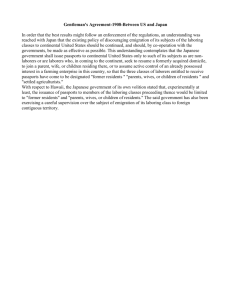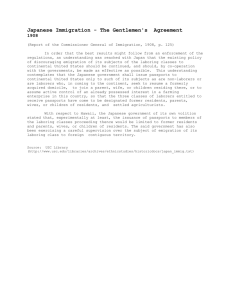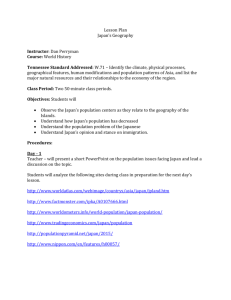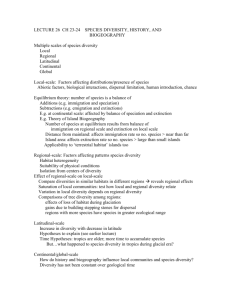Gentleman's Agreement
advertisement
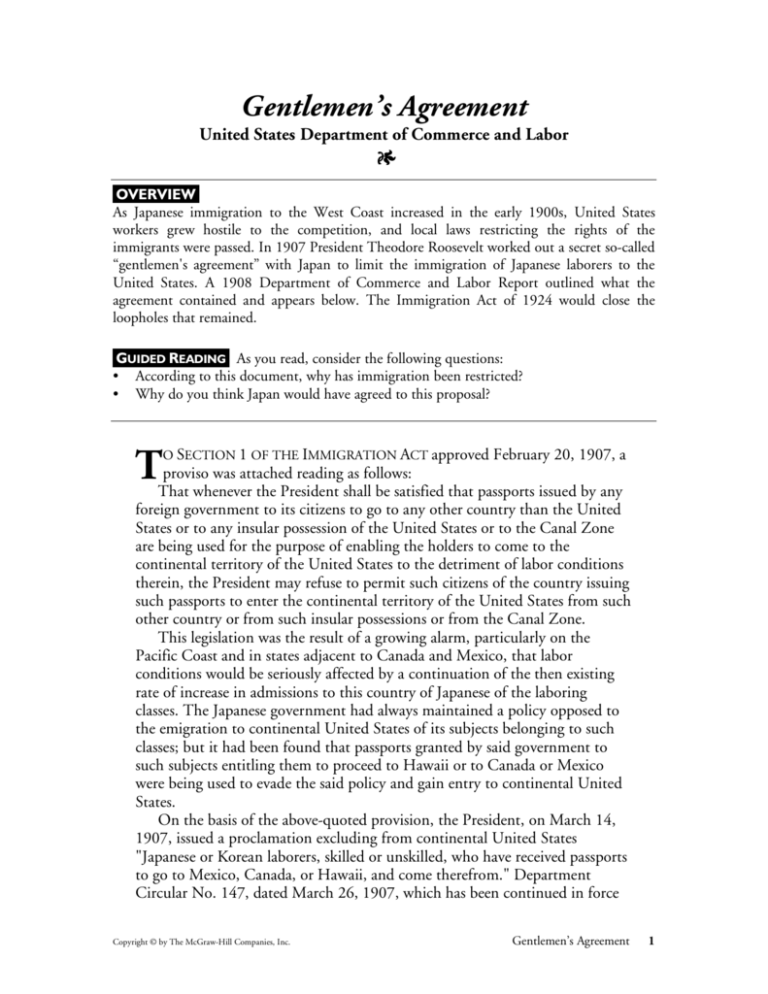
Gentlemen’s Agreement United States Department of Commerce and Labor 1 OVERVIEW As Japanese immigration to the West Coast increased in the early 1900s, United States workers grew hostile to the competition, and local laws restricting the rights of the immigrants were passed. In 1907 President Theodore Roosevelt worked out a secret so-called “gentlemen's agreement” with Japan to limit the immigration of Japanese laborers to the United States. A 1908 Department of Commerce and Labor Report outlined what the agreement contained and appears below. The Immigration Act of 1924 would close the loopholes that remained. GUIDED READING As you read, consider the following questions: • According to this document, why has immigration been restricted? • Why do you think Japan would have agreed to this proposal? T O SECTION 1 OF THE IMMIGRATION ACT approved February 20, 1907, a proviso was attached reading as follows: That whenever the President shall be satisfied that passports issued by any foreign government to its citizens to go to any other country than the United States or to any insular possession of the United States or to the Canal Zone are being used for the purpose of enabling the holders to come to the continental territory of the United States to the detriment of labor conditions therein, the President may refuse to permit such citizens of the country issuing such passports to enter the continental territory of the United States from such other country or from such insular possessions or from the Canal Zone. This legislation was the result of a growing alarm, particularly on the Pacific Coast and in states adjacent to Canada and Mexico, that labor conditions would be seriously affected by a continuation of the then existing rate of increase in admissions to this country of Japanese of the laboring classes. The Japanese government had always maintained a policy opposed to the emigration to continental United States of its subjects belonging to such classes; but it had been found that passports granted by said government to such subjects entitling them to proceed to Hawaii or to Canada or Mexico were being used to evade the said policy and gain entry to continental United States. On the basis of the above-quoted provision, the President, on March 14, 1907, issued a proclamation excluding from continental United States "Japanese or Korean laborers, skilled or unskilled, who have received passports to go to Mexico, Canada, or Hawaii, and come therefrom." Department Circular No. 147, dated March 26, 1907, which has been continued in force Copyright © by The McGraw-Hill Companies, Inc. Gentlemen’s Agreement 1 as Rule 21 of the Immigration Regulations of July 1, 1907, outlined the policy and procedure to be followed by the immigration officials in giving effect to the law and proclamation. In order that the best results might follow from an enforcement of the regulations, an understanding was reached with Japan that the existing policy of discouraging the emigration of its subjects of the laboring classes to continental United States should be continued and should, by cooperation of the governments, be made as effective as possible. This understanding contemplates that the Japanese government shall issue passports to continental United States only to such of its subjects as are nonlaborers or are laborers who, in coming to the continent, seek to resume a formerly acquired domicile; to join a parent, wife, or children residing there; or to assume active control of an already possessed interest in a farming enterprise in this country; so that the three classes of laborers entitled to receive passports have come to be designated "former residents," "parents, wives, or children of residents," and "settled agriculturists." With respect to Hawaii, the Japanese government of its own volition stated that, experimentally at least, the issuance of passports to members of the laboring classes proceeding thence would be limited to "former residents" and "parents, wives, or children of residents." The said government has also been exercising a careful supervision over the subject of the emigration of its laboring class to foreign contiguous territory. It will be seen, therefore, that the report for the past fiscal year covers a novel phase of the immigration question, viz., the exclusion from the continental portion of this country of certain classes of aliens, such exclusion being based in part upon the provision of law mentioned, but principally upon the mutual understanding of the two countries affected, and to be brought about largely by said two countries uniting upon a policy, agreed by both to be necessary and desirable, one of the countries exercising control over the departure and the other over the admission of the persons whose emigration and immigration it is desired mutually to control. Copyright © by The McGraw-Hill Companies, Inc. Gentlemen’s Agreement 2
